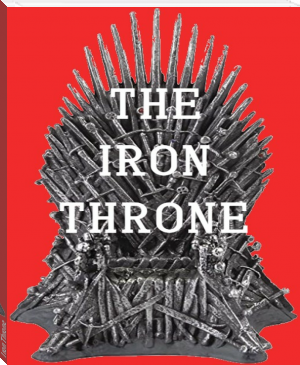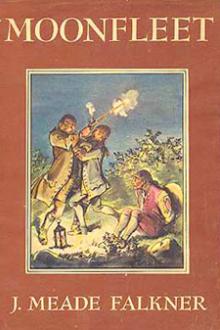Iron Throne - Ellen Gould-Harmon (best autobiographies to read .TXT) 📗

- Author: Ellen Gould-Harmon
Book online «Iron Throne - Ellen Gould-Harmon (best autobiographies to read .TXT) 📗». Author Ellen Gould-Harmon
"What I have just said plainly shows, I hope, that I have carefully weighed and considered the dangers to which I expose myself; but far from being dismayed, I rejoice to see that the gospel is now, as in former times, a cause of trouble and dissension. This is the character, this is the destiny, of the word of God. 'I came not to send peace on earth, but a sword,' said Jesus Christ. God is wonderful and terrible in His counsels; beware lest, by presuming to quench dissensions, you should persecute the holy word of God, and draw down upon yourselves a frightful deluge of insurmountable dangers, of present disasters, and eternal desolation. . . . I might quote many examples from the oracles of God. I might speak of the Pharaohs, the kings of Babylon, and those of Israel, whose labours never more effectually contributed to their own destruction than when they sought by counsels, to all appearance most wise, to strengthen their dominion. 'God removeth mountains, and they know it not.'"-- Ibid., b. 7, ch. 8.
Luther had spoken in German; he was now requested to repeat the same words in Latin. Though exhausted by the previous effort, he complied, and again delivered his speech, with the same clearness and energy as at the first. God's providence directed in this matter. The minds of many of the princes were so blinded by error and superstition that at the first delivery they did not see the force of Luther's reasoning; but the repetition enabled them to perceive clearly the points presented. Those who stubbornly closed their eyes to the light, and determined not to be convinced of the truth, were enraged at the power of Luther's words. As he ceased speaking, the spokesman of the Diet said angrily: "You have not answered the question put to you. . . . You are required to give a clear and precise answer. . . . Will you, or will you not, retract?"
The Reformer answered: "Since your most serene majesty and your high mightinesses require from me a clear, simple, and precise answer, I will give you one, and it is this: I cannot submit my faith either to the pope or to the councils, because it is clear as the day that they have frequently erred and contradicted each other. Unless therefore I am convinced by the testimony of Scripture or by the clearest reasoning, unless I am persuaded by means of the passages I have quoted, and unless they thus render my conscience bound by the word of God, I cannot and I will not retract, for it is unsafe for a Christian to speak against his conscience. Here I stand, I can do no other; may God help me. Amen." -- Ibid., b. 7, ch. 8.
Thus stood this righteous man upon the sure foundation of the word of God. The light of heaven illuminated his countenance. His greatness and purity of character, his peace and joy of heart, were manifest to all as he testified against the power of error and witnessed to the superiority of that faith that overcomes the world. The whole assembly were for a time speechless with amazement. At his first answer Luther had spoken in a low tone, with a respectful, almost submissive bearing. The Romanists had interpreted this as evidence that his courage was beginning to fail. They regarded the request for delay as merely the prelude to his recantation. Charles himself, noting, half contemptuously, the monk's worn frame, his plain attire, and the simplicity of his address, had declared: "This monk will never make a heretic of me." The courage and firmness which he now displayed, as well as the power and clearness of his reasoning, filled all parties with surprise.
The emperor, moved to admiration, exclaimed: "This monk speaks with an intrepid heart and unshaken courage." Many of the German princes looked with pride and joy upon this representative of their nation. The partisans of Rome had been worsted; their cause appeared in a most unfavourable light. They sought to maintain their power, not be appealing to the Scriptures, but by a resort to threats, Rome's unfailing argument. Said the spokesman of the Diet: "If you do not retract, the emperor and the states of the empire will consult what course to adopt against an incorrigible heretic." Luther's friend, who had with great joy listened to his noble defense, trembled at these words; but the doctor himself said calmly: "May God be my helper, for I can retract nothing."-- Ibid., b. 7, ch. 8. He was directed to withdraw from the Diet while the princes consulted together. It was felt that a great crisis had come. Luther's persistent refusal to submit might affect the history of the church for ages. It was decided to give him one more opportunity to retract. For the last time he was brought into the assembly. Again the question was put, whether he would renounce his doctrines. "I have no other reply to make," he said, "than that which I have already made." It was evident that he could not be induced, either by promises or threats, to yield to the mandate of Rome.
The papal leaders were chagrined that their power, which had caused kings and nobles to tremble, should be thus despised by a humble monk; they longed to make him feel their wrath by torturing his life away. But Luther, understanding his danger, had spoken to all with Christian dignity and calmness. His words had been free from pride, passion, and misrepresentation. He had lost sight of himself, and the great men surrounding him, and felt only that he was in the presence of One infinitely superior to popes, prelates, kings, and emperors. Christ had spoken through Luther's testimony with a power and grandeur that for the time inspired both friends and foes with awe and wonder. The Spirit of God had been present in that council, impressing the hearts of the chiefs of the empire. Several of the princes boldly acknowledged the justice of Luther's cause. Many were convinced of the truth; but with some the impressions received were not lasting. There was another class who did not at the time express their convictions, but who, having searched the Scriptures for themselves, at a future time became fearless supporters of the Reformation.
The elector Frederick had looked forward anxiously to Luther's appearance before the Diet, and with deep emotion he listened to his speech. With joy and pride he witnessed the doctor's courage, firmness, and self-possession, and determined to stand more firmly in his defense. He contrasted the parties in contest, and saw that the wisdom of popes, kings, and prelates had been brought to nought by the power of truth. The papacy had sustained a defeat which would be felt among all nations and in all ages. As the legate perceived the effect produced by Luther's speech, he feared, as never before, for the security of the Romish power, and resolved to employ every means at his command to effect the Reformer's overthrow. With all the eloquence and diplomatic skill for which he was so eminently distinguished, he represented to the youthful emperor the folly and danger of sacrificing, in the cause of an insignificant monk, the friendship and support of the powerful see of Rome.
His words were not without effect. On the day following Luther's answer, Charles caused a message to be presented to the Diet, announcing his determination to carry out the policy of his predecessors to maintain and protect the Catholic religion. Since Luther had refused to renounce his errors, the most vigorous measures should be employed against him and the heresies he taught. "A single monk, misled by his own folly, has risen against the faith of Christendom. To stay such impiety, I will sacrifice my kingdoms, my treasures, my friends, my body, my blood, my soul, and my life. I am about to dismiss the Augustine Luther, forbidding him to cause the least disorder among the people; I shall then proceed against him and his adherents as contumacious heretics, by excommunication, by interdict, and by every means calculated to destroy them. I call on the members of the states to behave like faithful Christians."-- Ibid., b. 7, ch. 9. Nevertheless, the emperor declared that Luther's safe-conduct must be respected, and that before proceedings against him could be instituted, he must be allowed to reach his home in safety.
Two conflicting opinions were now urged by the members of the Diet. The emissaries and representatives of the pope again demanded that the Reformer's safe-conduct should be disregarded. "The Rhine," they said, "should receive his ashes, as it had received those of John Huss a century ago."-- Ibid., b. 7, ch. 9. But princes of Germany, though themselves papists and avowed enemies to Luther, protested against such a breach of public faith, as a stain upon the honour of the nation. They pointed to the calamities which had followed the death of Huss, and declared that they dared not call down upon Germany, and upon the head of their youthful emperor, a repetition of those terrible evils.
Charles himself, in answer to the base proposal, said: "Though honour and faith should be banished from all the world, they ought to find a refuge in the hearts of princes." -- Ibid., b. 7, ch. 9. He was still further urged by the most bitter of Luther's papal enemies to deal with the Reformer as Sigismund had dealt with Huss--abandon him to the mercies of the church; but recalling the scene when Huss in public assembly had pointed to his chains and reminded the monarch of his plighted faith, Charles V declared: "I should not like to blush like Sigismund."--Lenfant, vol. 1, p. 422.
Yet Charles had deliberately rejected the truths presented by Luther. "I am firmly resolved to imitate the example of my ancestors," wrote the monarch.--D'Aubigne, b. 7, ch. 9. He had decided that he would not step out of the path of custom, even to walk in the ways of truth and righteousness. Because his fathers did, he would uphold the papacy, with all its cruelty and corruption. Thus he took his position, refusing to accept any light in advance of what his fathers had received, or to perform any duty that they had not performed.
There are many at the present day thus clinging to the customs and traditions of their fathers. When the Lord sends them additional light, they refuse to accept it, because, not having been granted to their fathers, it was not received by them. We are not placed where our fathers were; consequently our duties and responsibilities are not the same as theirs. We shall not be approved of God in looking to the example of our fathers to determine our duty instead of searching the word of truth for ourselves. Our responsibility is greater than was that of our ancestors. We are accountable for the light which they received, and which was handed down as an inheritance for us, and we are accountable also for the additional light which is now shining upon us from the word of God.
Said Christ of the unbelieving Jews: "If I had not come and spoken unto them, they had not had sin: but now they have no cloak for their sin." John 15:22. The same divine power had spoken through Luther to the emperor and princes of Germany. And as the light shone forth from God's word, His Spirit pleaded for the last time with many in that assembly. As Pilate, centuries before, permitted pride and popularity to close his heart against the world's Redeemer; as the trembling Felix bade the messenger of truth, "Go thy way for this time; when I have a convenient season, I will call for thee;" as the proud Agrippa confessed, "Almost thou persuadest me to be a Christian" (Acts 24:25; 26:28), yet turned away from the Heaven-sent message--so had Charles V, yielding to the dictates of worldly pride and policy, decided to reject the light of truth.
Rumours of the designs against Luther were widely circulated, causing great excitement throughout the city. The Reformer had made many friends, who, knowing the treacherous cruelty of Rome toward all who dared expose her corruptions, resolved that he should not be sacrificed. Hundreds of nobles pledged themselves to protect him. Not a few openly denounced the royal message of evincing a weak submission to the controlling power of Rome. On the gates of houses and in public places, placards were posted, some condemning and others sustaining Luther. On one of these were written merely the significant words of the wise man: "Woe to thee, O land, when thy king





Comments (0)